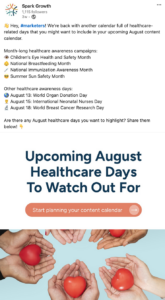For some healthcare marketers, the target market might not be general consumers — but rather, healthcare professionals (HCPs). How can you leverage organic and paid social media activities to reach HCPs, engage them, and nurture leads?
In this article, we share tips on how you can get their attention, hold their interest, and keep the conversations going!
Get Their Attention
If you don’t have an HCP’s attention already, that means you need to get it — but how?
On social media with organic content, this means using appropriate hashtags that your audience might be following and developing engaging content. It also helps to call out their job titles directly. Here’s an example of a post where we called out marketers:

With your organic social media, consider speaking the same “language” as your HCP audience — in other words, include terminology that may be too technical for the average consumer, but is easily understood by healthcare professionals. When your content is tailored to your HCP audience, this builds trust.
However, social media is an increasingly crowded space, meaning that relying solely on organic content may help improve brand awareness, but may not be able to support other objectives like lead generation and conversions. To ensure your healthcare brand shows up in front of the right audience, marketers will need to look at paid social media advertising. When it comes to paid social media ads, most platforms offer a variety of audience targeting options, whether it’s general interest-based targeting or detailed demographic targeting, like location, specialty/industry, and job title.
For some marketers, handling both the organic and paid digital marketing programs can be time-consuming, which is why they partner with specialized healthcare growth marketing agencies.
Hold Their Interest
Creating engaging content that will appeal to healthcare professionals can be a challenge for in-house marketers, but it helps if you start by putting yourself in their shoes. What do HCPs really want to know about? Asking yourself this question can direct your strategy for both your organic and paid social media content.
Many HCPs value educational content that helps them stay updated on the latest advancements in their field, so posts around clinical studies, case reports, and treatments relevant to your product or service may be useful.
Thought leadership content can also strategically position your healthcare brand online. Video interviews, Q&A sessions, and webinars add an element of interactivity and credibility to your healthcare brand — with the added bonus of helping to humanize your content, especially if it features people.
Anonymized case studies and testimonials can also help build credibility online, showcasing real stories featuring real customers and patients.
While there are a lot of different types of content to explore and create for your HCP audience, be cautious about what you’re sharing online on your branded social media pages. Ensure that your content adheres to ethical guidelines and industry regulations (e.g. HIPAA, FDA, etc.).
Learn more in our other articles:
- How to Approach Sensitive Healthcare Topics on Social Media
- The Role of Video Marketing in Healthcare Education and Engagement
Here’s another tip: Consider creating a long-term content series. Once your audience is hooked, they’ll continue to come back to your page to see new posts in the series. Consider Q&A-related content. This can take many forms, whether it’s a carousel or a short Reel on Instagram asking a doctor one question per video. Content series often cover broad topics, which means that marketers will have a lot of posts for their content calendars without needing to constantly come up with one-off social media ideas.
Keep The Conversation Going
Social media engagements come in many forms: a “like” on a post, a comment, a share. That being said, while these metrics can help marketers understand what types of content are resonating with their audience, moving HCPs further down the marketing funnel is your ultimate goal.
So, how do you use your social media content to keep the conversation going?
One of the first steps is to include clear, actionable calls to action (CTAs) that direct an HCP’s attention to the next step they should take, such as:
- Clicking a link to read an article
- Visiting a “Contact Us” page where an HCP can submit a question
- Downloading a free whitepaper
- Inviting them to sign up for a webinar about your healthcare product
Touchpoints where HCPs provide their name and contact information (usually in the form of an email address), enables you to nurture leads. Providing tailored content in a drip email campaign can establish your healthcare brand as a trusted and recognizable resource. This is also an effective time to share relevant case studies, whitepapers, or research articles that can further enhance brand awareness and credibility.
On the paid side, retargeting ad campaigns can keep your healthcare brand top-of-mind, reminding HCPs about your brand and product or service. A retargeting campaign reengages with potential customers — HCPs who have previously interacted with your brand in some way, like visiting your website.
Reaching Your Audience Of Healthcare Professionals
While we shared some tips on how healthcare marketers can reach their HCP audience, the reality is that it’s more complex than that! We haven’t even mentioned leveraging influencer marketing, website SEO (search engine optimization), and a host of other digital marketing activities.
If you’re looking to reach HCPs online, we can help! Click the button below to schedule a consultation with one of our healthcare marketing experts.


